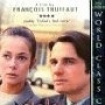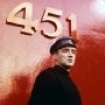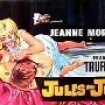Tirez sur le pianist
| 片名: | Tirez sur le pianist |
|---|---|
| 其它片名: | 射杀钢琴师 |
| 导演: | François Truffaut |
| 编剧: | François Truffaut, David Goodis |
| 制片人: | Pierre Braunberger |
| 摄影: | Raoul Coutard |
| 剪辑: | Claudine Bouché, Cécile Decugis |
| 主演: | Charles Aznavour, Marie Dubois, Nicole Berger |
| 音乐: | Georges Delerue |
| 片长: | 85分钟 |
| 年份: | 1960年 |
| 类型: | 剧情 |
| 国别: | 法国 |
| 语言: | 法语 |
| 格式: | |
| 制作机构: | Les Films de la Pléiade |
影片概述 . . . . . .
Masterful French director François Truffaut followed up his hard-hitting, absorbing, highly acclaimed drama LES QUATRE CENTS COUPS (1959) with a original film noir comedy, which is also considered one of his masterpieces and one of the most important movies of the Nouvelle Vague. Based on the US crime novel "Down There" by David Goods his visually fascinating, humanistic, clever and inventive comedy drama uses the story of a lonely, melancholic cafe piano man who through his criminal brothers gets into trouble with some gangsters and at the same time falls in love with a beautiful servant who discovers his past as a famous classic pianist only as a frame to make his own statements about relationships between men and women, success, glory, downfall and failure and at the same time paying a affectionate and ironic homage to the clichéd, low-budget Hollywood gangster films of the 40s and 50s. Though one could argue about the confuse narrative, this is a unique film experience with a virtuous cinematic style and many wonderful moments.
Vanilla and Raspberry. One of the funniest, most memorable, though also narrative-wise most unnecessary scenes has the real-life Parisian club singer Boby Lapointe delivering a vulgar, fast-paced song named "Vanilla and Raspberry" about the breasts of a woman. Add to this a handful of other plot-ignoring sequences that are masterfully directed, outstandingly acted and very well-written and you have seen the best parts of the movie. The main plot only holds together what usually wouldn't click together. There's a lot of comedy, a lot of melancholy, a lot of tragedy, a lot of pathos, some funny songs, strange locations, interesting characters and so on. It's really a work of a free-spirited artist trying everything to surprise his audience instead of boring it with a conventional plot. That's why the viewer is never sure what's going to happen next and so it's despite some lengthy dialogue and calm scenes pretty suspenseful. Another element that turns this patchwork into a near-masterpiece of cinematic history is Truffaut's use of awesomely beautiful cinematography, rough, unexpected cutting, unusual visuals composed in rhythm with the excellent score by Georges Delerue and a scene-setting voice-over by the hero. François plays with the visual concept of the story (it's a ironic comedy about melancholia with optimistic views on life and love set in a dark, nihilistic world!) and pretty much forgets about it in favour for hilarious moments like when one of the characters swears to tell the truth and if he doesn't his mother shall die immediately, Truffaut cuts to a old woman falling down in her room and back. Or when the scene of the cafe owner telling the bad guys where the piano player lives is split into three singular takes sharing the screen. There are plenty of other memorable moments like these and they're also magnificent. The perfect cast also delivers the goods. The sad-faced, but ultimately likeable Charles Aznavour, who was a popular singer in France, excels in the lead combining the elegance of a shy artist playing the tunes of Chopin and the coolness of a everyday piano player doing his job in a little cafe. The supporting actors are also fine, especially Jacques Aslanian has some scene-stealing moments as the bully and rude brother of Aznavour and the two women (the magnificent Nicole Berger and the wonderful Marie Dubois) playing the pianist's love interests are tremendously good.
为斩断不愉快婚姻回忆而隐姓埋名的钢琴师──爱德华,以假名──查理在巴黎一间默默无闻的小酒馆里担任伴奏钢琴师,生活单调且单纯。一日,多年未见的弟弟因躲避黑道仇家的追杀而闯进了他的生活中。
弟弟奇哥在酒馆里恣意玩乐,并透露了哥哥查理原是显赫一时的钢琴师的往事,此举引来脾气古怪又爱吹牛的酒保──蒲利的仰慕和奉承,也深深吸引了女侍──莲娜。兄弟两人的关系为众人所知后,弟弟又再度逃亡,不死心的匪徒于是决定将矛头转向查理。
仰慕查理的女侍莲娜开始频频主动示好,原本孤独沈默的查理渐渐为热情的莲娜所打动,两人关系渐见亲密,莲娜并试图怂恿查理恢复本名也恢复自我,重新走回舞台。
匪徒用计绑架查理与莲娜失败后,两人相偕逃亡,受到查理拒绝友谊和莲娜打击其男子气概的蒲利终于心生恨意,于是背叛查理与莲娜转而投效恶徒,几度阻挠两人的逃亡。
受到挟持和生命威胁的查理在混乱中刺杀了蒲利,最终为莲娜所救出,两人驾车逃亡。查理不愿莲娜继续犯险而将她送走,独自和兄弟奇哥在其父母的家会合,不料匪徒早已将其双亲赶走,行迹再度败露。
不放心的莲娜又回到查理身边,决心与查理共进退,两人在激烈的枪战中相偕逃逸,然幸运之神不予眷顾,莲娜终于中弹滚落斜坡,独留查理一人。
查理再度回到了往昔的小酒馆中,一切又回归起始,景物依旧的酒馆里来了新的女侍,在物是人非的哀伤里,查理仍是那个狐独的钢琴师。
Vanilla and Raspberry. One of the funniest, most memorable, though also narrative-wise most unnecessary scenes has the real-life Parisian club singer Boby Lapointe delivering a vulgar, fast-paced song named "Vanilla and Raspberry" about the breasts of a woman. Add to this a handful of other plot-ignoring sequences that are masterfully directed, outstandingly acted and very well-written and you have seen the best parts of the movie. The main plot only holds together what usually wouldn't click together. There's a lot of comedy, a lot of melancholy, a lot of tragedy, a lot of pathos, some funny songs, strange locations, interesting characters and so on. It's really a work of a free-spirited artist trying everything to surprise his audience instead of boring it with a conventional plot. That's why the viewer is never sure what's going to happen next and so it's despite some lengthy dialogue and calm scenes pretty suspenseful. Another element that turns this patchwork into a near-masterpiece of cinematic history is Truffaut's use of awesomely beautiful cinematography, rough, unexpected cutting, unusual visuals composed in rhythm with the excellent score by Georges Delerue and a scene-setting voice-over by the hero. François plays with the visual concept of the story (it's a ironic comedy about melancholia with optimistic views on life and love set in a dark, nihilistic world!) and pretty much forgets about it in favour for hilarious moments like when one of the characters swears to tell the truth and if he doesn't his mother shall die immediately, Truffaut cuts to a old woman falling down in her room and back. Or when the scene of the cafe owner telling the bad guys where the piano player lives is split into three singular takes sharing the screen. There are plenty of other memorable moments like these and they're also magnificent. The perfect cast also delivers the goods. The sad-faced, but ultimately likeable Charles Aznavour, who was a popular singer in France, excels in the lead combining the elegance of a shy artist playing the tunes of Chopin and the coolness of a everyday piano player doing his job in a little cafe. The supporting actors are also fine, especially Jacques Aslanian has some scene-stealing moments as the bully and rude brother of Aznavour and the two women (the magnificent Nicole Berger and the wonderful Marie Dubois) playing the pianist's love interests are tremendously good.
为斩断不愉快婚姻回忆而隐姓埋名的钢琴师──爱德华,以假名──查理在巴黎一间默默无闻的小酒馆里担任伴奏钢琴师,生活单调且单纯。一日,多年未见的弟弟因躲避黑道仇家的追杀而闯进了他的生活中。
弟弟奇哥在酒馆里恣意玩乐,并透露了哥哥查理原是显赫一时的钢琴师的往事,此举引来脾气古怪又爱吹牛的酒保──蒲利的仰慕和奉承,也深深吸引了女侍──莲娜。兄弟两人的关系为众人所知后,弟弟又再度逃亡,不死心的匪徒于是决定将矛头转向查理。
仰慕查理的女侍莲娜开始频频主动示好,原本孤独沈默的查理渐渐为热情的莲娜所打动,两人关系渐见亲密,莲娜并试图怂恿查理恢复本名也恢复自我,重新走回舞台。
匪徒用计绑架查理与莲娜失败后,两人相偕逃亡,受到查理拒绝友谊和莲娜打击其男子气概的蒲利终于心生恨意,于是背叛查理与莲娜转而投效恶徒,几度阻挠两人的逃亡。
受到挟持和生命威胁的查理在混乱中刺杀了蒲利,最终为莲娜所救出,两人驾车逃亡。查理不愿莲娜继续犯险而将她送走,独自和兄弟奇哥在其父母的家会合,不料匪徒早已将其双亲赶走,行迹再度败露。
不放心的莲娜又回到查理身边,决心与查理共进退,两人在激烈的枪战中相偕逃逸,然幸运之神不予眷顾,莲娜终于中弹滚落斜坡,独留查理一人。
查理再度回到了往昔的小酒馆中,一切又回归起始,景物依旧的酒馆里来了新的女侍,在物是人非的哀伤里,查理仍是那个狐独的钢琴师。
导演阐述 . . . . . .
获得奖项 . . . . . .
评论列表(0) . . . . . . ( 发表新评论 ) ( 更多评论 )
幕后花絮 . . . . . . (上传花絮) (展开所有)
根据美国作家大卫·古迪斯的小说改编,讲一个曾经闪耀在音乐厅的钢琴家爱德华自甘堕落,改名换姓为查理游荡于下层社会的酒吧。多年未见的弟弟因躲避黑道仇家的追杀而闯进了他的生活中。他也因涉嫌谋杀遭到匪徒的追杀。酒吧的侍女莲娜对他爱慕已久。在躲避匪徒的一次枪战中,莲娜不幸中弹身亡。查理再度回到了往昔的小酒馆中,一切又回归起始,景物依旧的酒馆里来了新的女侍,在物是人非的哀伤里,查理仍是那个孤独的钢琴师
——2009-03-24 14:33:49,4444上传
——2009-03-24 14:33:49,4444上传
影片图集 . . . . . . (更多/我要上传)
相关视频 . . . . . . (更多/我要分享)
- Tirez sur le pianist 2009-3-24 14:33,4444分享
对本影片资料作出贡献的会员 . . . . . .
4444(创建者)






































